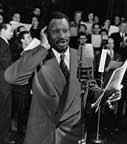PROGRAM
Thursday | Friday | Saturday
about the speakers | printable
version
“Orphans
Eve”
Wednesday, September 25th
Academy
Foundation Visiting Artist Program
An
evening with film composer David Raksin
USC School of Music, Recital
Hall,
7:30 p.m. (free, and open to all)
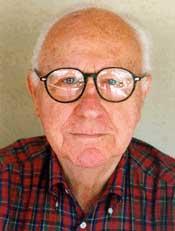
A
student of Schoenberg and collaborator with the likes of Stravinsky, Stokowski
and Gershwin,
David
Raksin
began
his career in movie music when Charlie Chaplin hired him to work on Modern
Times (1936). He has gone on to score more than 100 features, ranging
from the film noir Force of Evil (1948) to Nicholas Ray’s
melodrama Bigger than Life (1956), from Vincente Minnelli’s
Hollywood exposé The Bad and the Beautiful (1952) to ABC-TV’s
landmark The Day After (1983). His haunting song “Laura”
(written for the 1944 film Laura) has become a standard, recorded
more than 400 times. A professor of Scoring for Motion Pictures and Television
at the University of Southern California since 1956, Raksin has also written
for more than 300 television programs. For National Public Radio he wrote,
narrated and conducted interviews for the series “The Subject Is
Film Music,” a 64-hour oral history of the profession of film composing.
For CBS News, he wrote and narrated the documentary Camera
Three: Bernard Herrmann.
Maestro Raksin has been an
advocate and expert on music rights, serving on the boards of ASCAP, the
Society of Composers and Lyricists, and the Film Music Society. An 8-term
president of the Composers and Lyricists Guild, he currently advises the
Library of Congress as a member of the National Film Preservation Board.
Don’t miss this opportunity
to hear from a major figure in the past seven decades of film sound, as
David Raksin discusses his career in film music and presents excerpts
from his work. As a prelude to Orphans III, he will address important
issues facing the preservation, archiving and understanding of the often-neglected
soundtracks that accompany motion pictures.
| Thursday,
September 26th – Saturday, September 28th School of Music Recital Hall (a VR look inside) |
||||
| Welcome (9-9:15) | ||||
|
EARLY SOUND (9:15 - 11) David
Pierce
(British
Film Institute),
“British DeForest Phonofilm Recordings of the Music Hall Tradition” |
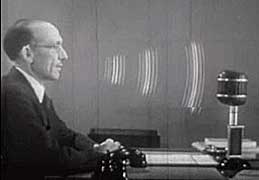 |
|||
|
NEWSREELS (11:15 - 12:45) Bob
Heiber (
Chace Productions),
"The Sound of Newsreels: Issues for Preservation & Restoration" |
||||
|
RE-DISCOVERY: SOUNDS OF THE FILMS OF ZORA NEALE HURSTON(2-3:45) Kristy
Andersen
(Bay Bottom News), “On Making BlackSouth:
The Life Journey of Zora Neale Hurston” |
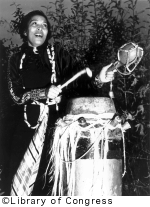 |
|||
|
GERMANY (4-5:45) Frances
Guerin
(University of Kent, England) "Perpetrator Images and The Third
Reich in Colour (2001)" |
||||
|
SCREENING (8-10) Scott
Stark (Flicker),
Found Home Movies Meet the Avant Garde |
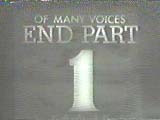 |
|||
|
|
||||
| Friday September 27 | ||||
|
Daniel
Goldmark
(University of Alabama), "Live Piano Accompaniment & DeForest
Sound for the Fleischer cartoon Has Anybody Here Seen Kelly? (1926)" |
||||
|
SHORTS (10:45-12:15) Shelley
Stamp
(UC Santa Cruz), "Shoes and The Unshod Maiden, or Giving Progressive
Cinema a Good Talking To: Unmaking and Restoring the Films of Lois
Weber” |
 |
|||
|
courtesy,
Library of Congress
|
||||
|
MY
SONG GOES FORTH (1:30-2:30)
|
||||
|
MEDIA MIGRATION (2:45-4:15) Bjørn
Sørenssen
(University of Trondheim), “Digitizing Filmed TV Ads from 1950s
Norway” |
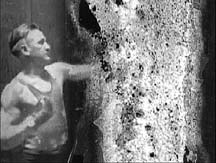 |
|||
|
PEOPLE LIKE US (4:30-5:30) British artist Vicki Bennett in performance |
||||
|
SCREENING (8-10) Alan
Berliner, “From ABC Audio Archivist to Independent
Documentarian: Selected Shorts by Alan Berliner” |
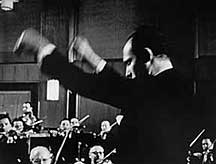 |
|||
| Saturday September 28 | ||||
|
Greg Pierce (Orgone Cinema and Archive) shows All Personal Sound Movies (1949-63), All Golf Films (c.1973) and more by amatuer Auricon cineaste Fred McCleod (Oakmont, PA). |
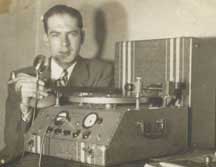 |
|||
|
AMATEUR (10:15-12) Jesse
Lerner
(Pitzer College), "Superocheros: Mexico's Super8 Film Movement,”
with José Agustín’s Luz Externa (1973) presented
with a restored soundtrack. |
||||
|
LOST VOICES OF THE DOCUMENTARY (1-2:45) Margarita
de la Vega (International Film Seminars), “Restoring 50
years of Audiotapes from the Robert Flaherty Film Seminar” |
||||
|
THE VOICE and the Music OF THE DOCUMENTARY (3-4:45) Ross
McElwee (Harvard), “Voice-over Narration Practices,”
with a preview of his new film Bright Leaves and outtakes from his
1986 masterpiece Sherman’s March |
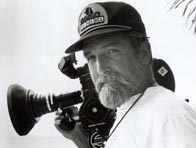 |
|||
|
MUSIC (5:15-6:45) Libby
Burke
(Visual Archives of American Music and University of Washington),
“Snader Telescriptions: Musical Film Filler for Early Television” |
||||
|
Orphan ‘Potluck’ (7:30 til ?) A wrap party event, back by popular demand. Bring a fun/interesting/odd/rare short or clip to share after our dinner together. We bring the food and drink, you bring the films. All orphanistas are invited to give a quick introduction to a favorite piece of orphan film or video (16mm or VHS please). Informal, engaging, fun. |
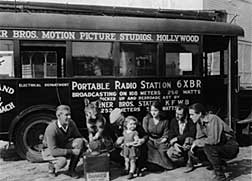 |
|||
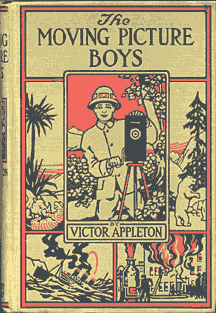 Margaret Compton (University of Georgia Media Archives & Peabody Awards Collection), “The Orphan as Filmmaker: Juvenile Series Fiction, 1912-1935," a curated exhibition of books on display throughout the symposium. |
||||
Artists
British found-sound artist People
Like Us
(aka Vicki Bennett), with a multimedia performance
+ her new film We Edit Life (2002)
Three of the great living documentary filmmakers:
• Legendary chronicler
of roots music Les
Blank (Flower Films) with unreleased performances recorded
on film during his decades of documenting figures such as Lightning Hopkins,
Leon Russell, Clifton Chenier, Flaco Jimenez and other music masters.
• From Harvard, Ross
McElwee (Columbia outtakes from Sherman’s March
& excerpts from his new film, Bright Leaves) talks about voice-over
narration technique.
• Emmy-winning New York
filmmaker Alan
Berliner (The Sweetest Sound), on his career as
an ABC News audio archivist turned independent documentarian.
+ Bill Morrison presents his new feature
film conceived and developed at the first Orphan film symposium:
Decasia
(2002), with new music by Bang on a Can composer Michael Gordon. Commissioned
by the basil sinfonietta of Switzerland as its premiere work. A tapestry
of found footage and decaying nitrate.
Archivists
Leaders of moving image preservation for four nations’
archives bring restored early sound films, including DeForest Phonofilms,
recordings of music hall artists, Eubie Blake performances, newsreels
and more:
William
O’Farrell (Chief of Moving Image and Audio Conservation,
National Archives of Canada)
David Pierce (Curator, National Film and Television Archive, British
Film Institute)
Ken Weissman
(Head, Motion Picture Conservation Center, U.S. Library of Congress)
Ray Edmondson (Curator Emeritus, National
Film and Sound Archive, Australia;
Director, Archive
Associates, Canberra), "The Voice of Australia: Cinesound
Review"
Rick
Prelinger (the Prelinger Archives), on digital access to
films at the Internet
Moving Images Archive), and the Internet Archive’s collaboration
with the orphan film movement.
The Library of Congress previews an important restoration of films
made by writer/anthropologist Zora Neale Hurston. In 1940, she
and a sound-film crew visited African-American churches in Beaufort, South
Carolina (and elsewhere), recording sermons and religious music. Lost
for nearly 60 years, the original audio disks have been rediscovered and
are being remastered to the motion pictures in the Library’s Margaret
Mead Collection.
Hear:
producer Kristy
Andersen discuss and excerpt her forthcoming feature documentary
BlackSouth: The
Life Journey of Zora Neale Hurston, co-produced for PBS by Sam
Pollard;
curator Elaine
Charnov (Director of Public Programs at the American Museum
of Natural History and artistic director of the Margaret
Mead Film & Video Festival) with her research on the Hurston films;
and archivist/cataloguer Arlene
Balkansky (LC-MBRS) and Ken Weissman presenting an update
from the restoration in progress.
Kay Hoffmann (Documentary Film Center, Stuttgart), Röntgenstrahlen, mit Filmtonspur (Germany, 1937): A Talking X-Ray Motion Picture.
Margaret Compton (University of Georgia Media Archives and Peabody Award Collection), "The Orphan As Filmmaker: Juvenile Series Fiction, 1912-1935," a curated exhibition of books on display at the symposium.
Steve Davidson (the Florida Moving Image Archive), African-American home movies of the 1950s and 60s.
Scholars
Charles
Musser (Yale University) introduces
a newly-preserved 35mm print of a British documentary about South Africa,
My Song Goes Forth (1937, aka Africa Sings), with
song and prologue
by Paul Robeson, in his first documentary appearance.
Shelley Stamp (UC-Santa Cruz), "Shoes and The Unshod Maiden, or Giving Progressive Cinema a Good Talking To." Lois Weber’s 1916 orphaned off-spring Shoes survives in the US only in the Library of Congress’s print of Universal's The Unshod Maiden, a 1932 parody of the film that uses voice-over commentary to mock a re-edited version. Weber’s plea for women's wage equity, re-worked in such a fashion, amply demonstrates Hollywood’s rapid disregard for silent cinema and Progressive-era politics in the wake of pre-recorded sound. (The restoration of Shoes is being planned with the Nederlands Filmmuseum, the Library of Congress, and Japan’s National Film Center.)
Frances Guerin (University of Kent, Canterbury, England), “Giving Voice to the Myth of Perpetrator Images: Using Nazi Footage in the BBC documentary program The Third Reich in Colour (2001).”
Rockefeller Media Fellow Jesse Lerner (Pitzer College) debuts a restored gem from Mexico’s superochero movement: Luz Externa (1973), a Super8 film by counterculture writer José Agustín. For the first time, the original music and dialogue tracks have been combined with the images.
Daniel Goldmark (University of Alabama), on scoring live piano accompaniment & DeForest recorded sound for the Fleischer cartoon Has Anybody Here Seen Kelly? (1926).
Neil Lerner (Davidson College), "An Ignored Parent to Hollywood's Musical Vocabulary: Virgil Thomson's Score for The Plow that Broke the Plains (1936)"
Ivan Raykoff (Whitman College),"Playback Pianists and the Crisis of Disembodiment." Ghosted piano performances, including Abbott & Costello TV appearances, c. 1951-52.
Bjørn Sørenssen (Norwegian University of Science and Technology), on-line access to digitized Norwegian film commercials of the 1950s, an experimental project with the Norwegian National Library in Mo i Rana.
Sam Bryan (Pratt Institute and New York International Film Foundation), showing travel documentaries shot by Julien Bryan in Stalin-era Soviet Union. [Watch Julien Bryan's 15-minute film Good Neighbor Family (1943) at the Internet Moving Images Archive. real player needed.]
Dana White (Emory University), the 1934-1946 housing reform films of crusading Atlanta businessman Charles F. Palmer.
Margarita de la Vega (International Film Seminars, New York) on restoring 50 years of audio recordings from the Robert Flaherty Film Seminars.
Curators
Greg Pierce of Pittsburgh's
Orgone
Cinema and Archive shows
All Personal Sound Movies (1949-63), All Golf Films
(c.1973) and more by amatuer Auricon cineaste Fred McCleod (Oakmont,
PA).
From Los Angeles, noted collector Mark Cantor (Celluloid Improvisations) with rare 16mm jukebox 'soundies' of the 1940s.
Libby Burke (University of Washington and the Visual Archives of American Music) plays Snader Telescriptions, 1950-54 film recordings of touring nightclub and cabaret acts, made in L.A. as early TV filler and filmed live in the studio.
Nico de Klerk brings a 35mm program of 1930s European theatrical short subjects from the Netherlands Film Museum.
Skip Elsheimer (A/V Geeks), presents 16mm School Films: The Musical.
Stephen Parr (San Francisco Media Archive and Oddball Film+Video), with some oddball films and video.
Scott Stark (Flicker), found home movies meet the avant garde.
Restoration,
lab and preservation experts
Robert
Heiber, president of
Chace Productions (Los Angeles), discusses recording, post-production,
restoration, and preservation technologies in “The Sound of Newsreels.”
Russ Suniewick, president of Colorlab
Inc. (Rockville, MD, and New York), on small-gauge blow-ups and
transfers, including 9.5mm home movies from the 1920s.
Joachim Polzer (Polzer Media Group GmbH, Potsdam) screens the earliest optical sound films and other material from his DVD (and companion book) Weltwunder der Kinematographie.
Grover Crisp, VP for Asset Management & Film Restoration, Sony Pictures Entertainment.
last updated: 7/10


